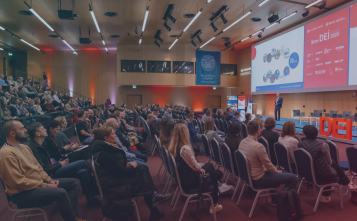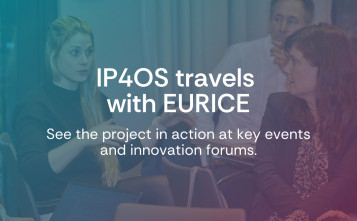
IP4OS at Metascience 2025: Empowering Open Science through IP
The IP4OS initiative was proud to contribute to the Metascience 2025 Conference in London on 1-3 July 2025, one of the leading global forums for exploring how science is designed, funded, communicated, and rewarded. The conference brought together an interdisciplinary community of scholars, funders, publishers, and institutional leaders to shape the future of research practice and infrastructure.
In this context, the IP4OS panel session “How Can Intellectual Property Rights Support Open Science?” tackled the complex question of how to reconcile intellectual property (IP) strategies with the goals of Open Science. The discussion centred on practical tensions and synergies between protection and openness in today’s (collaborative) research environments.
The session was chaired by Julia Priess‑Buchheit (Kiel University) — Prof. Dr. phil., award-winning expert in Open Science learning open science, ethics and integrity, and social technologies. As coordinator of the Horizon Europe project IP4OS, she brings deep experience in designing interdisciplinary programmes that connect intellectual property, research integrity, Open Science, and practice-based education across Europe.
The panel featured:
-
Gustav Nilsonne (Karolinska Institutet / IP4OS) — A leading voice in the European Open Science community; Gustav is Associate Professor of Neuroscience at Karolinska Institutet and Senior Advisor to the Swedish National Data Service. He works on metascience to assess and improve transparency and reproducibility of research. As the principal architect of IP4OS’s Synergy Framework (launched at the Metascience Conference), he guides institutions in aligning IP and Open Science strategies for collaborative, responsible research.
-
Claire Fritz (EURICE – European IP Helpdesk / IP4OS) — Head of IP & Innovation at EURICE and coordinator of the European IP Helpdesk; Claire highlighted the importance of integrated IP routines spanning grant support, data management, and knowledge valorisation.
-
Kamran Naim (CERN) — As Head of Open Science at CERN; Kamran advances openness across large-scale infrastructures, leading inclusive frameworks for data sharing, knowledge equity, and science policy innovation on a global scale.
-
Frantzeska Papadopoulou (Stockholm University) — Professor of private law and Chair of Intellectual Property Law; Frantzeska drives European discourse on copyright, licensing, and responsible IP governance. Her research has directly informed policy on data access and legal frameworks for Open Science.
The panel explored how institutional IP strategies can be reimagined to better support cross-sector collaboration, data-intensive research, and mission-driven innovation. The Synergy Framework, developed within IP4OS, served as a central reference point for the discussion—providing a practical approach for aligning legal, research, and valorisation activities at institutional level.
The discussion drew attention to institutional bottlenecks, misalignments between IP and Open Science governance, and the urgent need for more integrated support structures that reflect the (collaborative) realities of today’s research landscape. The Synergy Framework, developed by the IP4OS team, was referenced as a practical tool to support this institutional transformation. The team also presented the IP4OS training activities for multi-professional teams, set to pilot in the EU in 2026. These teams, consisting of experts in IP, OS, librarianship, research, and data management, will utilize openly accessible IP4OS materials like the Synergy Framework to drive the IP-OS concerted valorisation strategy.
The IP4OS team extends its thanks to the organisers of Metascience 2025 and looks forward to continuing the conversation on how IP can serve as a strategic enabler of open, inclusive, and impact-driven research systems across Europe and beyond.













